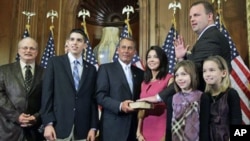In U.S. politics, the so-called Tea Party movement played a crucial role in helping Republicans make gains in Congress in last November’s midterm election. Tea Party leaders are vowing to keep a close watch on newly elected lawmakers, especially Republican leaders in the House of Representatives, where Republicans are now the majority party.
The Tea Party movement is a loose alliance of grassroots groups around the country that are generally conservative or Libertarian in outlook and united by a single theme-reducing the size and reach of the federal government.
Tea Party supporters have taken credit for the new Republican majority in the House and Republican gains in the Senate, and their leaders are vowing to keep the pressure on the new Congress to carry out the promise of lower taxes, budget cuts and smaller government.
North Carolina Tea Party activist Randy Dye recently attended a rally in Raleigh. "We are here to let the Republicans know that we are watching,” he said. “Just because they are elected, and we are glad they are elected, we are going to hold them accountable for the promises they have made."
Newly elected members of Congress who benefited from Tea Party support are determined to deliver on the election promises they made.
Republican Representative Allen West of Florida says voters and Tea Party supporters in particular are impatient for change. "The American people are looking for positive indicators and trends within the first 90 to 120 days and if they do not see that coming and that we are just more business as usual, we will get thrown on the ash heap as well," he said.
Republicans in Congress have already formed Tea Party Caucuses in both the House and Senate to push the demands of the Tea Party movement in Washington.
Rand Paul is a new U.S. senator from Kentucky who was elected in November with strong support from the Tea Party. Speaking at the first meeting of the Senate Tea Party Caucus’ Rand receive support from the crowd.
The relationship between Tea Party supporters and Republican congressional leaders continues to evolve.
Republican Congressman Paul Ryan gave the official Republican response to President Barack Obama’s State of the Union Address.
But another Republican House member, Congresswoman Michele Bachmann of Minnesota, also gave a response on behalf of some Tea Party groups. "And you voted out the big-spending politicians, and you put in their place great men and women with a commitment to follow our Constitution and cut the size of government," she stated.
For the moment, Republicans and Tea Party activists appear to be on the same page in the wake of last year’s election, united in working to repeal the Obama health care reform law and pushing for major cuts in federal spending.
Analyst John Fortier is with the American Enterprise Institute and was a guest on VOA’s Encounter program. "The big theme [of the election] was we are worried about debt, deficits and the size of government. And you do not even have to be the most radical Tea Party person to believe that. Many independents also have some queasiness about some very serious budget problems," he said.
Many experts foresee a prolonged congressional battle over government spending this year with President Obama and his Democratic allies in Congress trying to fend off deep budget cuts.
In his State of the Union Address, President Obama said he believes the election results in November mean the American people want the two parties to work together. "With their votes, they have determined that governing will now be a shared responsibility between parties. New laws will only pass with support from Democrats and Republicans," Mr. Obama said.
Republicans have plenty of political momentum in the wake of their November election victories. But President Obama has also made a comeback in public-opinion polls in recent weeks, says analyst Richard Wolffe.
"He has been making up substantial ground in recovering poll numbers and support from the middle of the country, from independent voters who left him over the last couple of years," Wolffe said.
The first major political test for the president, Republicans and the Tea Party will come in a matter of weeks when Congress will be asked to raise the debt limit so that the government can continue to borrow money. Republicans are insisting on deep cuts as part of any deal to raise the debt limit, and experts will be closely watching the extent to which Tea Party endorsed lawmakers will be willing to compromise on the issue, if at all.
Tea Party Keeps Close Eye on Republicans




